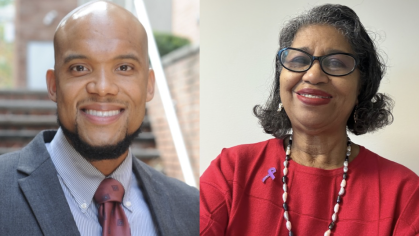In fall 2020, the School of Social Work (SSW) launched the IIDEA Committee to further inclusion, intersectionality, diversity, equity, and the advancement (IIDEA) of social justice at the school. In May 2021, faculty voted that the SSW would adopt Dr. Barbara Love’s liberatory consciousness framework to guide curriculum development as well as the work of students, faculty, and staff (see the sidebar on the following pages for more information).
Here is just a glimpse into how the committee is leveraging this framework to enhance the coursework, culture, and communication at the SSW.
Charge: Centralize and prioritize the work of the committee
Change: New administrative position
In order to be effective, the IIDEA Committee needed a chairperson to focus and direct its activities. Out of this need, Professor Antoinette Y. Farmer, Ph.D. was appointed as committee chair and the school’s inaugural associate dean for diversity, equity, and inclusion (DEI).
Farmer was drawn to this position, in part, because of its unique nature; as she points out, few schools of social work have a position dedicated solely to DEI. “I hope by serving in this position that I am creating an environment in the school where faculty, staff, and students believe that their voices are heard and their input is valued,” she says, “where students feel prepared to work with individuals from diverse backgrounds because they have become more knowledgeable about what has affected them as a result of policies, practices, and structural barriers; and where faculty, staff, and students are empowered to make real changes that will have lasting impact, as they strive to advance IIDEA.”
Charge: Incorporate a guiding framework
Change: Added competency in liberatory consciousness
The Council on Social Work Education (CSWE) is the accrediting body for all social work baccalaureate and master’s programs in the United States and its territories. Part of its Educational Policy and Accreditation Standards (EPAS) is a competency-based approach to curriculum design. CSWE’s nine competencies range from demonstrating ethical and professional behavior to advancing social, racial, economic, and environmental justice; engaging in policy analysis; intervening with individuals, families, groups, organizations, and communities; and more. CSWE also allows social work programs to develop and implement their own competencies.
At the SSW, a liberatory consciousness competency has been added to the curriculum to formalize Dr. Love’s framework as a school-wide touchstone, and students are now evaluated on their attainment of this competency in the following courses:
- MSW courses Diversity & Oppression, Clinical Social Work II, and Program & Strategic Planning
- BASW course Diversity & Oppression
This new competency is also integrated into every practicum placement and may eventually be integrated into every SSW course. In the meantime, all students are educated (though not necessarily evaluated) on the framework.
Charge: Develop ways to address oppression happening at the school and beyond
Change: Anonymous email box
In an effort to identify and address any oppression or inequalities happening at the school, the IIDEA Committee launched an anonymous email inbox. Suggestions, questions, and criticisms received are shared with the committee and administrators, and stakeholders are engaged to find a solution.
In the first year of the committee’s existence, student representatives identifying as transgender informed the committee that they and other transgender students were experiencing inappropriate treatment in the classroom and in their practicum placements. As a result, a few actions were taken.
First, SSW faculty and staff received a specialized training hosted by the Transgender Training Institute, which addressed current issues impacting the transgender community, inclusive practices for faculty and lecturers, and broader recommendations for creating an inclusive learning environment and community for trans, non-binary, and gender diverse students.
Second, SSW Professor Emily Greenfield and Assistant Professor of Teaching Christine Morales elevated the concerns reported to the IIDEA Committee to the New Brunswick Faculty Council, which then developed and passed the Resolution in Support of Students Identifying as Transgender, Nonbinary, and Other Gender Identities. This university-wide resolution emphasizes Rutgers’ responsibility to uphold human rights and dignity. In this way, the IIDEA Committee not only made concrete change at the school, but also guided inclusivity at the university level.
Their hope is that this new email box will encourage students to continue to come forward so additional work can be done.
Charge: Assess IIDEA initiatives at the school and communicate updates to the community
Change: Communication and transparency via reports and newsletters
The main way the IIDEA Committee showcases its work is with its annual report. Distributed widely in the school community and beyond, the report outlines the goals, initiatives, events, and impact of the IIDEA Committee each year. This year, it includes information about how the school’s IIDEA strategic plan aligns with the university’s newly implemented DEI strategic plan.
The committee also circulates an internal newsletter to faculty, staff, and students that outlines the goals and action steps of the committee, as well as updates, highlights, and events related to IIDEA.
Charge: Advance scholarship focused on the liberatory consciousness framework
Change: New writing group, virtual conference, research awards, and study
One of the criticisms of Dr. Love’s framework is that it hasn’t been widely studied or used to develop a curriculum. In response, Farmer convened a writing group that included tenured, tenure-track, and non-tenure-track faculty, as well as staff and students. This group meets every three months to discuss possible areas of research.
So far, writing group members have explored how the liberatory consciousness framework can inform inclusive pedagogy, mentorship of the queer community, and even study abroad opportunities. Plus, a group of faculty members is currently evaluating the framework’s implementation in the Clinical Social Work I course. In the fall, the IIDEA Committee plans to host a virtual conference, where members of the writing group can present their scholarship on the liberatory consciousness framework.
In conjunction with the school’s Research Advisory Committee, the IIDEA Committee also created two research awards to support scholarship related to IIDEA: the Exemplary IIDEA Research Recognition Award (for faculty and staff) and the Emerging Scholar IIDEA Research Award (for students). The awardees are honored at the school’s convocation ceremony and also receive a monetary award.
| Liberatory Consciousness Framework 101 Dr. Barbara Love’s liberatory consciousness framework consists of four elements, known colloquially as the Four As:
|
Committee Members in Action
The IIDEA Committee is designed to reflect the diversity of the School of Social Work community. Here, committee members discuss how they’re bringing IIDEA concepts back to their roles as faculty members, staff, and students.
Faculty Spotlight: Tawanda Hubbard, associate professor of professional practice
Tawanda Hubbard leverages her role on the IIDEA Committee to embody true inclusivity and intersectionality in her various roles as an educator.
In the classroom, Hubbard begins each course by developing a social working agreement, or a collaborative agreement she and her students make together about how they will be and speak with one another. This includes a definition of respectful communication, how students will behave when they are challenged or when differences emerge, how they will respond to microaggressions or offenses, and how to create an accountable and safe enough space for everyone to participate. “Each class is its own entity, and this agreement is not the same for every class,” Hubbard says. “We discuss current events, social issues, mental health issues, how to provide services, and other heavy topics. This process of outlining the social working agreement allows us to lean into these sometimes difficult conversations in a prepared way.”
Hubbard also holds herself accountable to her students by incorporating herself into this agreement—a new element she’s introduced in the spring 2024 semester. “I have power in the instructor role,” she explains. “I want to know how the students want me to show up and respect that power, and how we can best collaborate together.”
Hubbard has also begun to integrate the liberatory consciousness framework into her coursework. “I encourage my students to use the Four As as a lens to inform their practice,” she says. “As social workers, we bring so much to the table when it comes to clinical practice, in that we help people manage their thoughts, feelings, and behaviors, and navigate relationships and environments. With that being said, it’s important to factor in social justice and advocacy.” Her students are trained on the Four As, and assignments connect back to these concepts across practice as well as clinical, policies, macro, and management courses.
In addition to her work with students, Hubbard trains professional social workers and allied counterparts in the community on social justice, implicit bias, and inclusive leadership. Here, too, she has started incorporating the liberatory consciousness framework. “There are many theories and practice models that we have adopted in our profession that, when you examine them closely, are very Eurocentric,” she says. “I challenge practitioners to expand their perspectives in how we think about the work, the people we work with, and the decisions we make.
Graduate Student Spotlight: Zan Haggerty, LCSW, MSW, doctoral student and licensed clinical social worker
The IIDEA Committee includes a student representative from each of the school’s academic programs. Representing the doctorate of social work (DSW) program is Zan Haggerty, a clinician-scholar who is both a doctoral student and a Rutgers staff member at Counseling and Psychiatric Services (CAPS). In CAPS, their focus is on serving communities with marginalized identities; in their research, they examine how oppressive systems impact these communities. As a result, they prioritize building on and moving beyond individual interventions to also focus on creating safe and inclusive systems, communities, and cultures.
Haggerty’s role on the IIDEA Committee is to serve as a liaison between the committee members and students in the DSW program. “It allows the faculty, staff, and others on the committee to maintain a close connection with student needs, and respond to those needs as much as possible,” Haggerty says. “My focus as a student representative is on the classroom experience, because that’s generally where we spend the most time and, in my opinion, where there is potential for the most harm.”
Because Haggerty holds various roles on campus, they implement lessons learned on the IIDEA Committee quite regularly. As a lecturer, they explicitly teach the liberatory consciousness framework in courses like Clinical Social Work I, and they also incorporate IIDEA concepts into their teaching style.
At CAPS, Haggerty leads the Next Step Program and the Gender and Sexual Diversity team, and also occasionally works with MSW interns. Here, too, Haggerty implements liberatory consciousness framework lessons and takeaways, both when supervising clinicians and when working with clients. “I have a constant eye on how to liberate individuals and communities from forces of oppression and I’m constantly analyzing my position of power in the workplace,” they say. “I want to wield that power for better and not in service of oppression, so I’m constantly thinking of that in the classroom and with clinicians, colleagues, and clients.”
Undergraduate Student Spotlight: Julia Katz, senior, Bachelor of Arts in Social Work
Julia Katz knows firsthand how intimidating it can be to speak up in a room full of social work professionals, faculty members, and administrators. But she also knows she has an important role to fill on the IIDEA Committee: to represent her fellow undergraduate students and bring their input to the table. “As a student, I know how certain policies and efforts would affect us, and bringing that perspective to the committee is so important,” she says. “The liberatory consciousness framework is focused on action and practice, so it’s also quite empowering to bring issues to the committee on behalf of students and work together towards a holistic solution.”
In fact, Katz says the liberatory consciousness framework has shifted her perspective on learning and practice in general. In the classroom, she finds herself analyzing the power dynamics that may exist between students and how those dynamics can cause some to share their opinions openly while others stay silent. In her practicum placement, it means acknowledging her own privilege when working with different populations and making adjustments so everyone is comfortable. “As a student, you learn about all kinds of different theories and frameworks, but what’s unique about the liberatory consciousness framework is that it’s applicable to everyday life because it’s grounded in the human experience,” she says. “I’ve worked with clients from age 8 to 80, and it applies to working with all of them.”
Katz’s practicum placement is at a nonprofit called Empower Somerset located in Somerville, New Jersey, which provides evidence-based prevention education focusing on topics such as substance abuse, mental health, sexual health, and more. Katz works directly with various groups served by the center—including veterans, students, and seniors—but she also participates in macro efforts like Narcan/naloxone distribution and the development of marketing materials to explain complex government policies to the general public. “What I’ve learned in the committee is how to hear other people’s perspectives, and that has served me well in practicum,” she says. “Everyone brings something different to the table and if we don’t listen and work as a diverse team, it’s impossible to make tangible change.”
Staff Spotlight: Thomas E. Benjamin, MCM, senior program coordinator, Center for Research on Ending Violence
Thomas Benjamin was elected to the IIDEA Committee in spring 2021 as the academic/ educational programs/research staff representative, and was excited to join. “I thought the School of Social Work was the best place to set an example as an organizational workplace and academic culture that embodies inclusiveness, recognizes diversity, and looks for ways to advance fair and equitable treatment,” he says.
Benjamin works at the Center for Research on Ending Violence, where he administers a grant that funds client services for survivors as well as education, training, and outreach for students, staff, and faculty. Additionally, Benjamin’s role at the Center includes extensive reporting and evaluation of client data, as well as reporting findings to the university-wide Office for Violence Prevention and Victim Assistance.
As the academic/educational programs/ research staff representative, he speaks not only for those working in the Center for Research on Ending Violence, but also for a range of staff who work in various units throughout the school. For Benjamin, this means recognizing that there is a power hierarchy in higher education and acknowledging that the committee may not be immune to them.
Benjamin also incorporates lessons learned in the committee into his role at the Center for Research on Ending Violence. “We’re utilizing the liberatory consciousness framework to increase our awareness of the issues and concerns that are top of mind for various groups of people,” he says. As such, he works to hold the Center accountable and takes action as an ally for marginalized voices.
Plus, Benjamin utilizes more inclusive language and tactics in his reporting, so as to remain accurate and sensitive to how certain groups want to identify. “We know there are certain groups that are more prone to certain kinds of violence,” he says. “It’s important to remain sensitive to the fact that not only are these people survivors of violence, but also that certain groups experience violence in a way that’s marginalized and disregarded. I’m continuously challenging myself to report in a way that’s accurate as well as inclusive and sensitive to those societal issues.”



